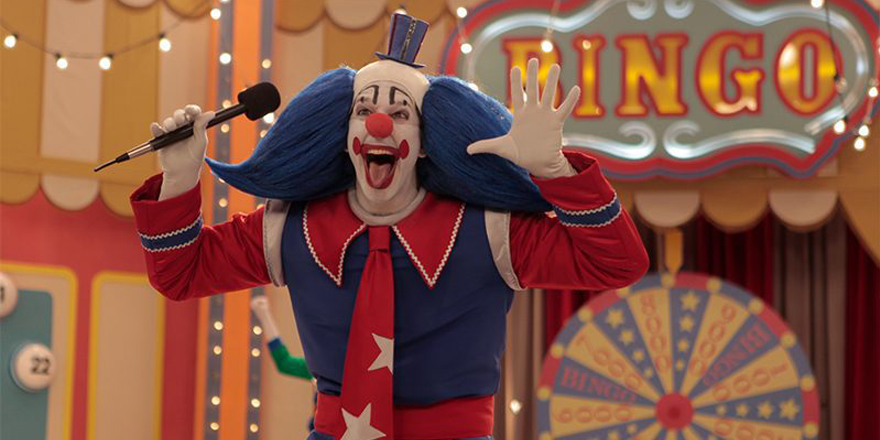Reviewed by Lee Hill
“My makeup is dry and it cracks round my chin / I’m drowning my sorrows in whiskey and gin,” The Kinks sang on their 1967 hit single, The Death of a Clown, and that in many ways sums up the theme of Bingo: The King of Mornings. Audiences love a tale of the clown that cries on the inside. Bingo is the slickly executed directorial debut of Daniel Rezende, the Oscar nominated film editor of City of God, Elite Squad, Motorcycle Diaries and the Tree of Life. This is the fictionalized reworking of the real life of Arlindo Barreto, who became a perverse kind of celebrity in the 80s playing the Brazilian version of Bozo the clown. To preserve his mystique for children, Arlindo was not allowed to reveal his identity, which hampered future acting prospects and led him into a cycle of alcohol and drug abuse.
For reasons of copyright and poetic license, Bozo/Arlindo is Bingo/Augusto in Rezende’s film. As reinvented in Luiz Bolognesi’s screenplay, Augusto Mendes (superbly played by Vladimir Brichta), son of a once famous theatre and TV actress Marta (Ana Lucia Torre), is struggling to break out of the soft-porn niche his good looks have landed him in. He auditions for the Brazilian franchise of the popular US children’s program and thanks to his gift for ad libs that amuse the kids and bring knowing winks from the parents, he becomes an unlikely star. Augusto becomes caught up in the party till the coke runs out lifestyle of a celebrity with more money than real friends, He loses touch with his son (Cauã Martins) from his broken marriage and the passion for his craft that made him so good as Bingo in the first place. His hedonistic descent also sabotages his efforts to win the love of his attractive producer, Lucia (Leandra Leal), a devout Christian in her private life.
The decline, fall and redemption of Bingo is an arc familiar to anyone who was ever watched a made-for-TV movie. Alas, it is this familiarity and the efficient, but conventional mise-en-scene that takes away from the energy of the performances and dig deeper into Brazil’s fascinating pop culture with its eroticized children’s programs and byzantine soap operas. The most authentic sections of the film are those that take place in the dog eat dog environment of the TV studio where Augusto must battle with Lucia and the US executive to make the original American scripts connect with Brazilians. While prowling the clubs of Sao Paulo, Augusto spots a vivacious exotic dancer and decides she will be perfect in slightly toned-down form to add to the buzz of the live broadcasts and bring in the Dads for even higher ratings. In moments like this Bingo reaches the delirious satirical heights of Network or All That Jazz.
Bingo is Brazil’s official entry in the Best Foreign Film category for the 90th Academy Awards, but it will face stiff competition from the likes of Chile’s Fantastic Woman, Argentina’s Zama, Russia’s Loveless or Austria’s Happy End when nominations are announced. Rezende’s first feature as director benefits from a pitch-perfect cast, but alas the wider frame he has built around their performances is too controlled and impersonal. The coda shows Augusto touring churches as a kind of born-again self-help guru using his clown persona to affirm the need for family and an inner life. A more ambitious script would have shown us more of this transformation or even questioned its validity.
Bingo is a confident first film with an especially powerful lead performance by Britchta, but one wishes Rezende had taken the cue from some of the auteurs he has worked with and taken the source material as far as his imagination would go. For a story about such an unlikely and surreal real-life character Bingo errs on the side of convention in its second half. Pablo Larrain’s 2008 film Tony Manero followed a similar figure trying to stake out his claim in the world of ratings driven TV, but it was also charged with haunting political resonance. By contrast, Bingo the film plays it too safe even though the character at its centre is, in his unique way, a risk taker.
Director: Daniel Rezende
Writers: Luiz Bolognesi, Fabio Meira (collaborating writer)
Stars: Vladimir Brichta, Emanuelle Araújo, Raul Barreto
